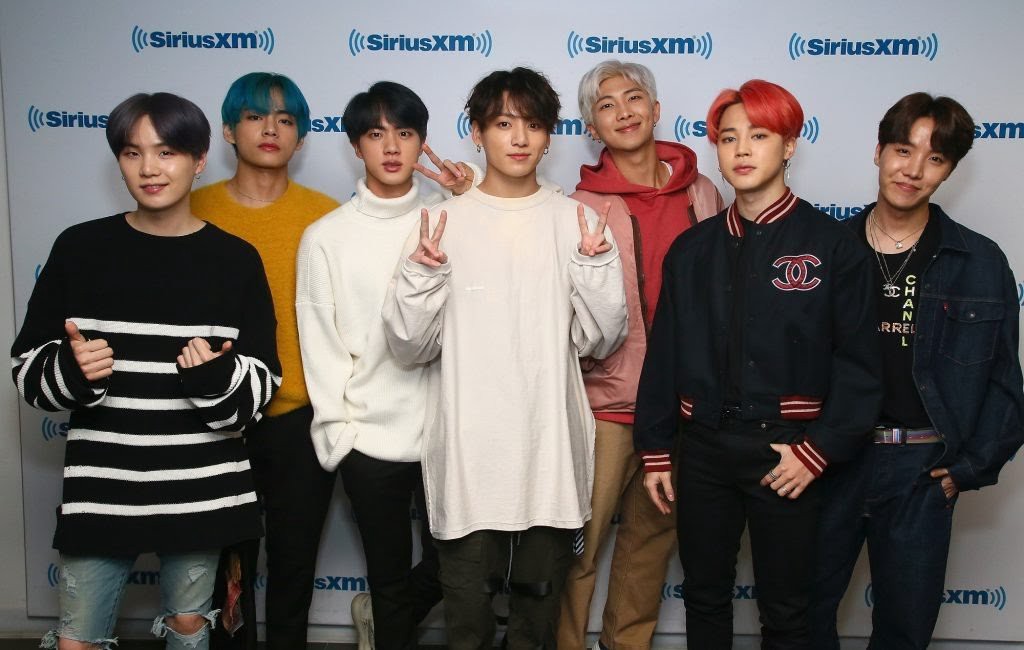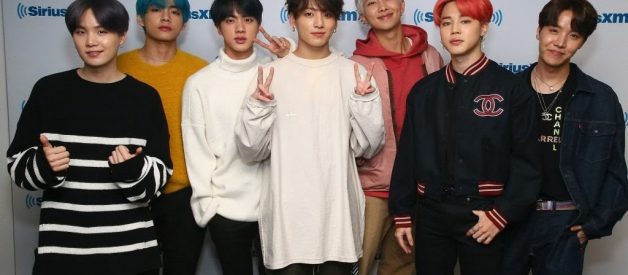
BTS released their official MBTI personality types during BTS Festa 2017
Myers-Briggs Type Indicator (MBTI) MBTI is a psychological test that is designed to indicate an individual?s psychological preferences in how he/she perceives the world and how he/she makes decisions. The founders of the MBTI are Katherine Cook Briggs and her daughter Isabel Briggs Myers. It is based on the typological theory proposed by Carl Jung who said that there are four psychological functions by which we experience the world and make decisions: ? Sensing (S): Called a perceiving function because individuals who are sensing trust information that is tangible and concrete that can be gathered by the five senses from around them. They distrust “gut” feeling and hunches. ? Intuition (N): Called a perceiving function because individuals who are intuitive trust information that is less dependent on the five senses and can be discovered by learning a pattern from the world around them. They trust their “gut” feeling and hunches. ? Feeling (F): Called a decision-making function because feelers tend to make decisions based on their own personal experiences or by relating to and empathizing with the situation they are making a decision in. They will make decisions based on theories and not facts most of the time. When they make decisions, they consider the needs of the people involved. ? Thinking (T): Called a decision-making function because thinkers tend to make decisions in a logical, reasonable way that matches a set of rules (rules around them or their own personal rules they set themselves). They will make decisions based on facts most of the time. When they make decisions, they do it in a logical way and sometimes do not consider the needs of the people involved. There are other components to the MBTI that tell more about an individual?s interests, needs, values, and motivation: ? Introversion (I): Called an attitude because introverts tend to be inward-turning which means they prefer to concentrate on their internal world of ideas and reflection. That doesn?t mean they are anti-social. Introverts tend to like interacting with small groups of close friends and family. They are different than extroverts in that they lose energy after socializing or doing any activity for a long time and need to spend time alone to recharge their energy and reflect. ? Extroversion (E): Called an attitude because extroverts tend to be outward-turning which means they prefer to concentrate on their external world of behavior, action, people, and things. That doesn?t mean they are always social. Extroverts tend to like interacting with large groups of friends and family, but they often spend time alone to reflect. They are different than introverts in that they gain energy from socializing or doing any activity for a long time and also need time t o reflect, but they lose energy from spending time alone for a long time while introverts gain energy from alone time. ? Judging (J): Called a lifestyle preference because judging types like to have closure or like to “have matters settled.” They tend to stay with their endeavors for a long time and carry through them until the end or constantly improved themselves in that area. For example, if a J type is a good dancer, he/she will practice and practice until he/she is an expert dancer. ? Perceiving (P): Called a lifestyle preference because perceiving types like to keep their options open or like to “keep decisions open.” They tend to move around from endeavor to endeavor for a long time and improve themselves at many new things rather than stick to one old thing and put all of their energy into that one endeavor. For example, if a P type likes to write music, he/she will write music and improve in that area. But if a P type is inspired by a movie and wants to try acting, he/she will take a break from music and try acting. BTS MBTI PERSONALITY TYPE
Seokjin – INTP; “The Logician? The Logician personality type is fairly rare, making up only three percent of the population, which is definitely a good thing for them, as there?s nothing they?d be more unhappy about than being ?common?. Logicians pride themselves on their inventiveness and creativity, their unique perspective and vigorous intellect. Usually known as the philosopher, the architect, or the dreamy professor, Logicians have been responsible for many scientific discoveries throughout history. They love patterns, and spotting discrepancies between statements could almost be described as a hobby, making it a bad idea to lie to a Logician. This makes it ironic that Logicians? word should always be taken with a grain of salt ? it?s not that they are dishonest, but people with the Logician personality type tend to share thoughts that are not fully developed, using others as a sounding board for ideas and theories in a debate against themselves rather than as actual conversation partners. This may make them appear unreliable, but in reality no one is more enthusiastic and capable of spotting a problem, drilling through the endless factors and details that encompass the issue and developing a unique and viable solution than Logicians ? just don?t expect punctual progress reports. People who share the Logician personality type aren?t interested in practical, day-to-day activities and maintenance, but when they find an environment where their creative genius and potential can be expressed, there is no limit to the time and energy Logicians will expend in developing an insightful and unbiased solution.
Min Yoongi, Jungkook – INFP ?Mediator? Mediator personalities are true idealists, always looking for the hint of good in even the worst of people and events, searching for ways to make things better. While they may be perceived as calm, reserved, or even shy, Mediators have an inner flame and passion that can truly shine. Comprising just 4% of the population, the risk of feeling misunderstood is unfortunately high for the Mediator personality type ? but when they find like-minded people to spend their time with, the harmony they feel will be a fountain of joy and inspiration. Being a part of the Diplomat Role group, Mediators are guided by their principles, rather than by logic (Analysts), excitement (Explorers), or practicality (Sentinels). When deciding how to move forward, they will look to honor, beauty, morality and virtue ? Mediators are led by the purity of their intent, not rewards and punishments. People who share the Mediator personality type are proud of this quality, and rightly so, but not everyone understands the drive behind these feelings, and it can lead to isolation.
Hoseok – ESFJ; ?Consul? People who share the Consul personality type are, for lack of a better word, popular ? which makes sense, given that it is also a very common personality type, making up twelve percent of the population. In high school, Consuls are the cheerleaders and the quarterbacks, setting the tone, taking the spotlight and leading their teams forward to victory and fame. Later in life, Consuls continue to enjoy supporting their friends and loved ones, organizing social gatherings and doing their best to make sure everyone is happy. Discussing scientific theories or debating European politics isn?t likely to capture Consuls? interest for too long. Consuls are more concerned with fashion and their appearance, their social status and the standings of other people. Practical matters and gossip are their bread and butter, but Consuls do their best to use their powers for good.
Jimin – ENFJ: ?Protagonist? Protagonists are natural-born leaders, full of passion and charisma. Forming around two percent of the population, they are oftentimes our politicians, our coaches and our teachers, reaching out and inspiring others to achieve and to do good in the world. With a natural confidence that begets influence, Protagonists take a great deal of pride and joy in guiding others to work together to improve themselves and their community People are drawn to strong personalities, and Protagonists radiate authenticity, concern and altruism, unafraid to stand up and speak when they feel something needs to be said. They find it natural and easy to communicate with others, especially in person, and their Intuitive (N) trait helps people with the Protagonist personality type to reach every mind, be it through facts and logic or raw emotion. Protagonists easily see people?s motivations and seemingly disconnected events, and are able to bring these ideas together and communicate them as a common goal with an eloquence that is nothing short of mesmerizing. The interest Protagonists have in others is genuine, almost to a fault ? when they believe in someone, they can become too involved in the other person?s problems, place too much trust in them. Luckily, this trust tends to be a self-fulfilling prophecy, as Protagonists? altruism and authenticity inspire those they care about to become better themselves. But if they aren?t careful, they can overextend their optimism, sometimes pushing others further than they?re ready or willing to go. Protagonists are vulnerable to another snare as well: they have a tremendous capacity for reflecting on and analyzing their own feelings, but if they get too caught up in another person?s plight, they can develop a sort of emotional hypochondria, seeing other people?s problems in themselves, trying to fix something in themselves that isn?t wrong. If they get to a point where they are held back by limitations someone else is experiencing, it can hinder Protagonists? ability to see past the dilemma and be of any help at all. When this happens, it?s important for Protagonists to pull back and use that self-reflection to distinguish between what they really feel, and what is a separate issue that needs to be looked at from another perspective.
Taehyung, Namjoon – ENFP: ?Campaigner?
(in the result released in 2017 Namjoon was together with Yoongi and Jungkook in the INFP personality, but Namjoon remake the test in early 2019 and changed to ENFP)
The Campaigner personality is a true free spirit. They are often the life of the party, but unlike types in the Explorer Role group, Campaigners are less interested in the sheer excitement and pleasure of the moment than they are in enjoying the social and emotional connections they make with others. Charming, independent, energetic and compassionate, the 7% of the population that they comprise can certainly be felt in any crowd.More than just sociable people-pleasers though, Campaigners, like all their Diplomat cousins, are shaped by their Intuitive (N) quality, allowing them to read between the lines with curiosity and energy. They tend to see life as a big, complex puzzle where everything is connected ? but unlike Analyst personality types, who tend to see that puzzle as a series of systemic machinations, Campaigners see it through a prism of emotion, compassion and mysticism, and are always looking for a deeper meaning.Many other types are likely to find these qualities irresistible, and if they?ve found a cause that sparks their imagination, Campaigners will bring an energy that oftentimes thrusts them into the spotlight, held up by their peers as a leader and a guru ? but this isn?t always where independence-loving Campaigners want to be. Worse still if they find themselves beset by the administrative tasks and routine maintenance that can accompany a leadership position. Campaigners? self-esteem is dependent on their ability to come up with original solutions, and they need to know that they have the freedom to be innovative ? they can quickly lose patience or become dejected if they get trapped in a boring role.


